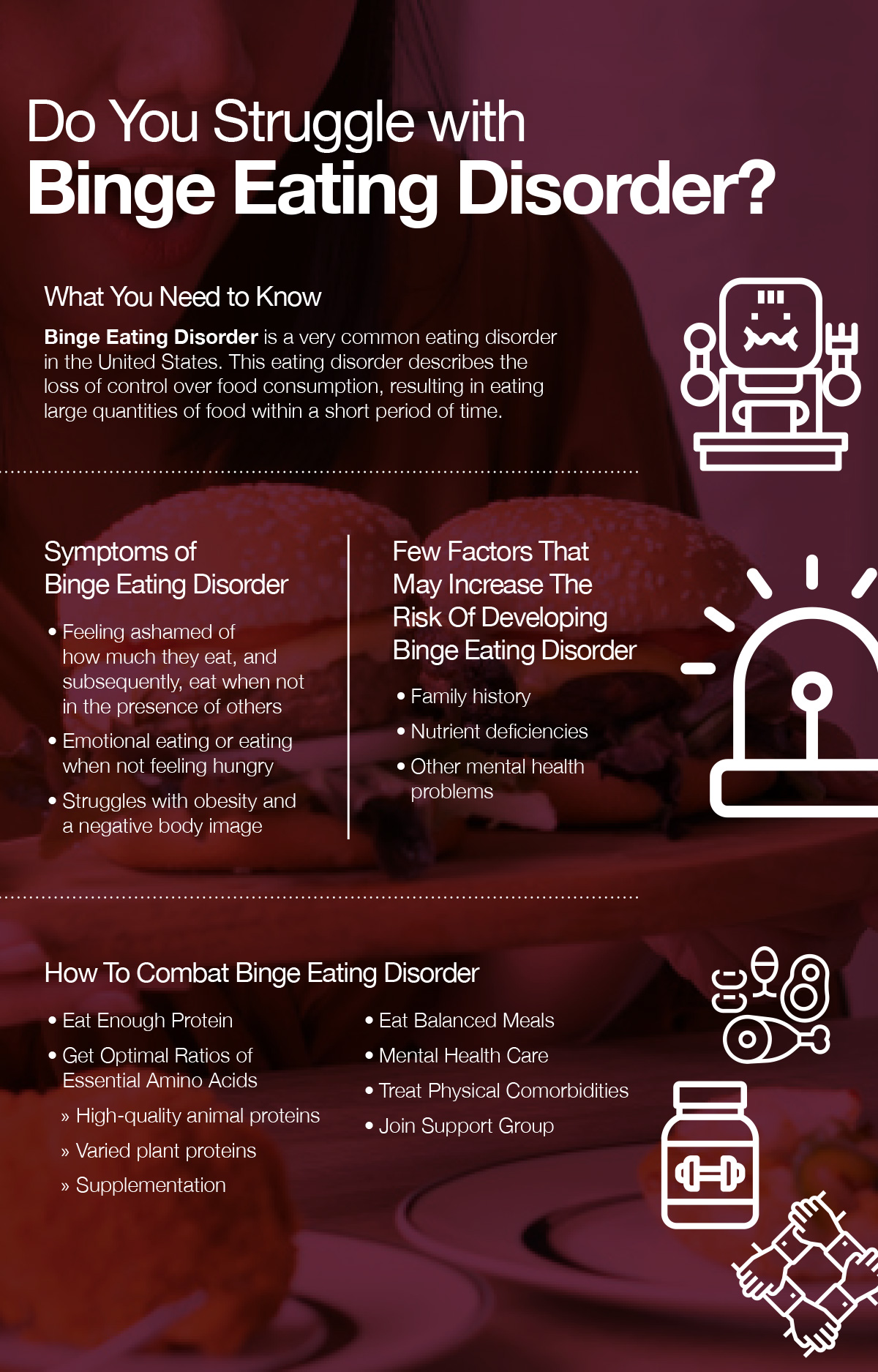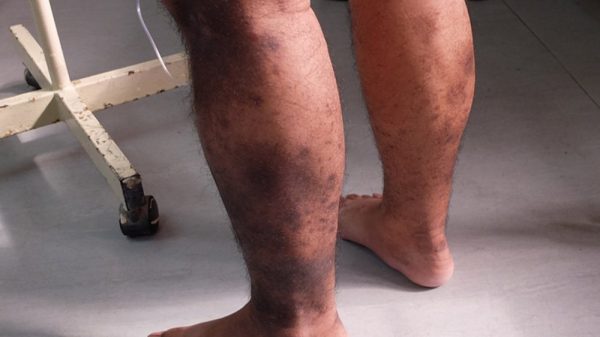Binge eating disorder is a very common eating disorder in the United States. However, the condition can be hard to pinpoint. Here we go through everything you need to know about binge eating disorder, including signs and symptoms, risk factors, and methods of management and treatment.
If you have binge eating disorder, you don’t have to live with it forever. There are many treatment strategies and ways to manage the condition, in order to improve your quality of life. Read on to find out more.
What Exactly Is Binge Eating Disorder?
Binge eating disorder describes the loss of control over food consumption, resulting in eating large quantities of food within a short period of time. The condition is a diagnosable disorder listed in the Diagnostic and Statistical Manual of Mental Disorders (DSM-5). People struggling with binge eating disorder are unable to control their food intake and eating habits, and often eat very large amounts of food in one sitting. The severity of the condition is often measured by the number of episodes of binge eating that occur per week.
What Are the Symptoms of Binge Eating Disorder?
They may find themselves feeling ashamed of how much they eat, and subsequently eat when not in the presence of others.
Someone with binge eating disorder may also try to stop overeating by going on diets. Inevitably, diets fail, which has a significant impact on confidence and self-esteem. People with binge eating disorder may also constantly eat in response to emotions, or eat when not feeling hungry. Individuals with binge eating disorder may also struggle with obesity and a negative body image.
Keep in mind that someone with binge eating disorder will usually not compensate for bingeing by purging, starving, overusing laxatives, or overexercising. All of these compensation strategies are very harmful to your health and are general characteristics of other eating disorders like bulimia.
What Causes Binge Eating Disorder?
There isn’t one underlying cause of binge eating disorder. Instead, the development of binge eating disorder is likely the result of a combination of genetic and environmental factors. Here are a few factors that may increase the risk of developing binge eating disorder:
- Family history: If a close family member struggles with disordered eating patterns, there’s a higher chance that you may too.
- Nutrient deficiencies: Nutrient deficiencies may also contribute to extreme cravings and overeating.
- Other mental health problems: Other mental health conditions like bipolar disorder, substance abuse disorder, and depression may increase the risk of developing
Combating Binge Eating Disorder
If you struggle with binge eating disorder, rest assured that there are effective treatment options and management strategies.
Eating Enough Protein
Protein is a satiating nutrient because it digests slowly, making you feel more full for longer. Because of this, high-protein foods provide lasting energy that may help curb the urge to overeat.
Optimal Ratios of Essential Amino Acids
Amino acids are another reason why getting plenty of protein is critical for managing binge eating disorder. Essential amino acids are the smallest units of protein that the body utilizes to build muscle tissue, neurotransmitters, hormones, and enzymes. Getting optimal ratios of essential amino acids helps ensure that the body has enough building blocks to create hormones like leptin and ghrelin, which help regulate our appetite by notifying us of when we’re hungry and full.
Getting balanced ratios of essential amino acids is also important for maintaining muscle mass, supporting metabolic health, and improving longevity.
So how can you ensure that you’re getting the protein you need? There are a few ways that you can ensure that you’re getting sufficient amounts of protein in your diet.
- High-quality animal proteins: High-quality animal proteins each provide optimal ratios of essential amino acids. Reach for products like egg whites, skim milk, low-fat cheese, chicken breast, turkey breast, and fish.
- Varied plant proteins: Unlike animal proteins, all plant protein sources are missing at least one essential amino acid. As a result, it’s important to eat a variety of plant proteins throughout the day to meet your essential amino acid needs.
- Supplementation: Taking a high-quality supplement is a convenient and healthy way to ensure that you’re getting the essential amino acids you need.
Eating Balanced Meals
When you are eating a meal, try to ensure that you’re eating a balance of all macronutrients. Getting sufficient amounts of fat, protein, and complex carbohydrates in your meal help to keep hunger at bay for longer.
Plus, it’s important to eat a varied diet. Getting a range of fruits, veggies, whole grains, beans, nuts, seeds, lean meat, and dairy can help reduce the risk of nutrient deficiencies that can worsen cravings.
Mental Health Care
If you find that you can’t control the amount of food you eat, it’s a good idea to see a mental health care professional. Both specialists in psychiatry and cognitive behavioral therapy (CBT) can play an important role in managing binge eating disorder.
A psychiatrist can evaluate your symptoms and create a treatment plan that fits your needs. In some cases, antidepressants can be helpful for preventing binge eating episodes. Psychotherapy can help reframe eating behaviors and find healthier alternatives to managing emotions.
Treating Physical Comorbidities
Binge eating disorder is often accompanied by weight gain and associated conditions like high blood pressure, type 2 diabetes, and high cholesterol. Managing the root cause of binge eating disorder will likely naturally result in weight loss, in turn helping to resolve weight-related health risks. However, medications can still be a helpful tool for managing blood pressure and insulin levels.
Joining a Support Group
In addition to eating disorder treatment and interventions, joining a support group can be a crucial strategy for managing binge eating disorder. Regularly attending support group meetings allows you to connect with other people who have similar experiences. Together, your group can share coping strategies and help each other stay accountable.
Things to Keep in Mind
If you have any concerns or warning signs of an eating disorder, it’s important to reach out to your health care provider. A mental health professional will be able to evaluate your symptoms and diagnose your condition. A healthcare provider can help you make a treatment plan that works best for your needs.
In Summary
Binge eating disorder is a condition in which a person is unable to control their food intake. Attempts at dieting and managing food intake usually fail. If you think you have binge eating disorder, it is crucial to make an appointment with your healthcare provider. Dietary changes, medications, therapy, and support groups are all crucial parts of the treatment plan for binge eating disorder.
























